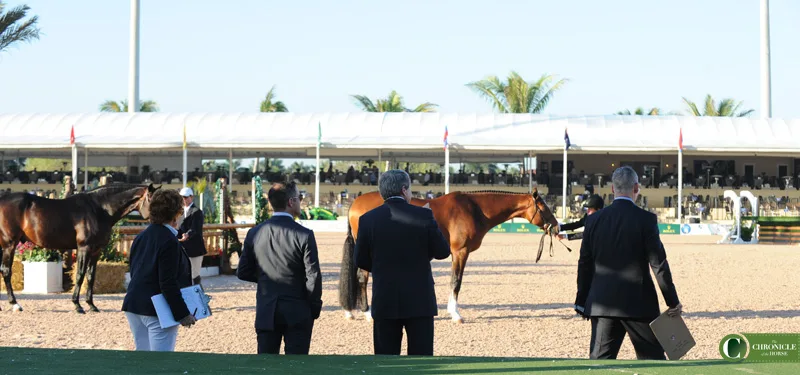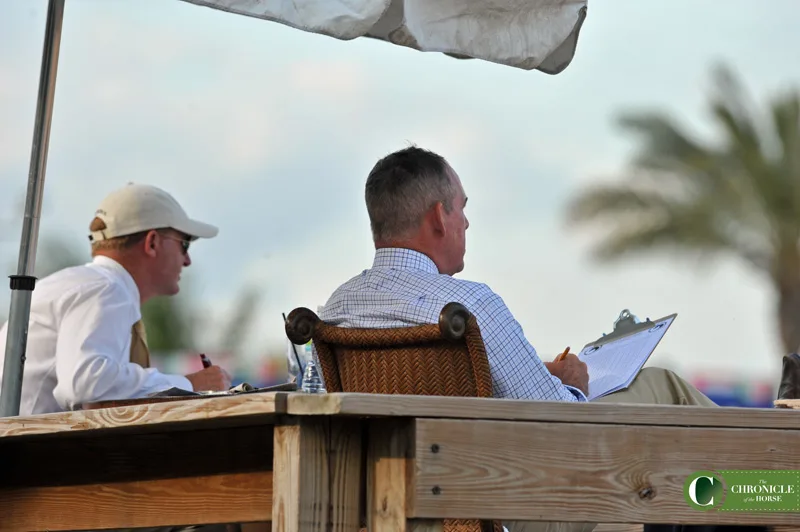In my last post I took issue with the oft-heard claim that horse show judging is subjective. Instead, I suggested, in theory—and I’d guess for the most part in reality—judges in hunter and equitation classes are supposed to be and indeed are judging based on collectively held understandings about what the perfect round looks like.
I conceded, of course, that achievement of the idealized version of judging is impossible. Different judges come from different schools of thought and will reach different conclusions about how a class should be placed. It’s imprecise, but that’s not the same as subjective.
But I also acknowledged that there’s room for improper factors to taint the judge’s work. Judgment might be clouded by things like a rider’s reputation or the existence of a prior relationship between a rider and the judge or even something such as the judge’s personal fondness for a certain type of horse. This could happen intentionally, of course. It could also happen unwittingly, for the same reasons that human thinking is regularly distorted by forces we’re not conscious of.
Indeed, there is plenty of evidence from studies in other judged sports such as figure skating and gymnastics to support the conclusion that these improper factors do have an influence. Unsurprisingly, judges have difficulty maintaining the same standards over the course of an extended competition, and those competitors who appear later in a sequence tend, on average, to receive higher scores than those who appear earlier. Judges who work in panels, and who are able to see one another’s scores, tend to converge toward a shared standard. Reputation, affiliation and a judge’s past experience with a competitor can also influence scoring. (It bears emphasis that these things are all tendencies rather than things that inevitably occur. That’s part of why we’re so often blind to them.)
None of this is surprising to me as someone who comes to these questions from the legal world, where there are rules and procedures that at least attempt to address analogous influences. The audiences of judges I have spoken to over the years have, for the most part, been receptive to the suggestion that they should account for the possibility that their judgment might be unwittingly distorted. Indeed, when one looks to other judged sports one sees that they, too, have taken steps to attempt to mitigate some of these concerns.
So let’s talk about the sorts of things the horse world might do in an effort to firm things up. I’m doing this in a brainstorming, no-idea-is-a-bad-idea, “let me see if I can provoke some thought” sort of spirit, and in doing so am drawing on my study of how judging is structured in law and in other judged sports. (In other words, each of these things is done by at least one judged sport that appears in the Olympics.) Not all of what I suggest will be workable, for various reasons, but I think it’s worth discussing nonetheless. I hope the judges in the horse world will accept this sort of discussion as graciously as judges in the legal world.

Chad Oldfather has drawn from other judged sports to come up with ideas to eliminate possible biases in judging. Mollie Bailey Photos
Tightening up the consensus. One way to achieve greater uniformity is to reduce the scope of disagreement over what counts as excellence. Doing so would increase the level of consistency across judges while also making it more likely that spectators and competitors would agree with judges’ placings.
ADVERTISEMENT
This is a tall order. It would require achieving greater consensus across the sport, and a reduction in the number of schools of thought. Pulling that off would involve more regimentation of the sport than seems likely to happen, including perhaps the implementation of a much more structured process for becoming a riding instructor. It’s the sort of thing that exists in the figure skating world, where I’ve also served my share of dad duty, but in the horse world the changes would likely have to be more incremental.
Making the rules more explicit. Consider Rule 430.f of the International Skating Union: “Officials must … not show bias for or against a competitor on any grounds; be completely impartial and neutral at all times; base their marks and decisions only on the performance and not be influenced by reputation or past performance; [and] disregard public approval or disapproval …”
There is not, so far as I can tell, any truly analogous provision in the U.S. Equestrian Federation rule book. GR 1033(1) provides: “A judge serves three interests: his own conscience, exhibitors and spectators. He should make it clear that the best horses win.” And 1033(6) adds, “The decisions of each judge constitute solely his individual preference …” This language leaves room for the sort of truly subjective judging I disparaged in my first post, and the conflict of interest restrictions in GR1038 are so narrow as to provide little real counterweight.
In a sense, I’m not surprised. For me, one of the more striking parts of reading George Morris’ autobiography was his more or less open acknowledgement that in a Maclay-type class it matters to the judge who a rider’s trainer is. Of course, if the goal is to determine which rider had the best round on a particular day, then that sort of information should play no role at all. Instead, one should be able to expect that the favorite will sometimes fall short, and that occasionally a little-known rider will have the round of her life, same as happens in other sports. Formally endorsing this in the rules wouldn’t solve all the problems, but it would be a significant start.
Judging panels. Another difference between the equestrian and figure skating worlds is that the latter uses of panels of judges (usually five) at even the lowest levels of competition. It makes sense. Where there’s likely to be a lack of agreement from one judge to the next about how to rank competitors, the use of multiple judges brings multiple perspectives. The result is that the collective views of the panel are more likely to represent those held across the sport as a whole. (In my experience, there is generally broad agreement among the judges, but also quite a bit of variation in the specific rankings.) I know that some of the top equestrian events use multiple judge panels, but the bulk of judging is done individually. Broader use of panels would be a major change, and would likely entail a shift to volunteer judges (see below), but it’s at least worth putting out there.
Banning communication among judges. Twice I’ve found myself sitting near a panel of judges working a class. In both cases the judges were talking with one another as they were judging, and in both cases it was obvious to me that it was affecting how they were judging. In one situation one of the judges was quite clearly simply acquiescing to the conclusions of the other. This completely undermines the value of panel decision-making. Most, if not all, of the other sports that use panels of judges expressly prohibit them from communicating with one another while they are judging. I’m not even going to hedge here. The horse world should follow suit.

Chad Oldfather believes in the benefits of having judging panels but suggests communication between judges should be limited.
Compensation. Another very striking difference between the figure skating and horse worlds is that in the former all judges, from the lowest levels to the Olympics, are volunteers who are compensated for their expenses only. I’m not familiar enough with the workings of how horse show judges get paid to speculate on how it might affect their incentives, but I’ve lived long enough to appreciate that whenever there’s money changing hands the potential for corrosive effects exists somewhere. I’m confident that it would be no problem at all to find a sufficient number of people in the horse world to judge on a volunteer basis. At the same time, I’m under no illusions that this change is coming any time soon. The more general point is that things such as who hires the judges and how and under what constraints they do so can have very real effects on how those judges go about their jobs, and it’s worth considering whether any adjustments might be made to further the perceived integrity of the sport.
ADVERTISEMENT
Mental breaks. Horse-show judges often have incredibly long days. Meanwhile, it’s beyond dispute that each of us has only a limited amount of mental energy, and that our minds don’t work the same when that energy is depleted. Figure skating recognizes this. There the panels of judges are swapped out and reshuffled from one event to the next. The days are long, but they include frequent breaks. Here again, an analogous change in the horse world would require substantial restructuring of the current ways of doing things. Still, the idea is worth entertaining.
These are only a few suggestions, briefly sketched. Much of this, I recognize, is pie-in-the-sky stuff. Ways of doing things become entrenched and seem natural if not inevitable. People understandably worry about the consequences of change, both intended and unintended.
But I don’t think I’m alone in being concerned that people so casually regard judging as subjective in the full sense of the word, and that everyone just sort of gives a “what are you gonna do” shrug when someone openly acknowledges that it matters which trainer is standing at the in-gate. It doesn’t have to be quite like that. These are conversations worth having, I think, and I hope the horse world is willing to have them.
Chad Oldfather is the blogging COTH Horse Dad. He’s the non-horsey father of two junior hunter/jumper/equitation riders, and he’s taking readers along on his horse show parenting journey. By day, he’s a law professor in Wisconsin, but on weekends and evenings, he can be found, laptop in hand, ringside at a lesson or show. Read his first blog, “My Soul For An Equitation Horse” to get to know him.
Read all of Chad’s COTH Horse Show Dad blogs for the Chronicle.
You can also follow his adventures on his Facebook page The Chronicles of a Horse Dad.














